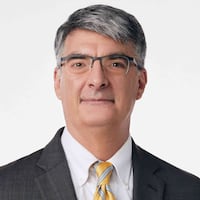DIRTY DOZEN / ERIC GREGG
We have dubbed them Atlanta’s Dirty Dozen – the villains of Atlanta Sports. We use the term villain loosely. Some are simply sports figures who proved a thorn in our side, stood in our way, or prevented greatness. OK, some are true villains. We’ll let you decide who is who.
In an 11-week series, The Atlanta Journal-Constitution will highlight one of the Dirty Dozen. We will present the series in ascending order, from No. 12 to No. 1. Each story will be accompanied by a video with our staff discusses why each made our list.
We invite you to provide your thoughts each week. Email us at sportstips@ajc.com. We will publish some of the comments each week. Finally, at the series’ conclusion Oct. 15, with the No. 1 villain, we will post a poll allowing you to vote on your top villains.
Eric Gregg. Say no more.
The home plate umpire for Game 5 of the 1997 National League Championship Series between the Braves and the Marlins was, in a word, awful.
Don’t take our word for it. Baseball America once voted it the third-worst called game from 1975-2000.
Chipper Jones was so mad, he couldn’t finish his thought.
As the AJC’s Steve Hummer wrote years later: “And to this day still, geometrists and civil engineers are trying to fathom the dimensions of Eric Gregg’s strike zone.”
Livan Hernandez struck out an NLCS-record 15 in the Marlins’ 2-1 win in the pivotal Game 5 in Miami on Oct. 12. The Marlins took a 3-2 series lead and won the series in Game 6. They went on to beat Cleveland in the World Series.
“I’m so mad right now, I can’t see straight,” Jones said after the game. “Some people work their whole lives to get into this situation, and when you’re not allowed to do your job ...”
Gregg had an expansive strike zone with punch out after punch out coming after pitches that never came close to crossing the plate. Perhaps nothing sums up the game more than the final pitch. Left-hander Fred McGriff struck out with a 3-2 count on a pitch that literally was in the right-hand batters’ box. It was McGriff’s third strikeout of the game. Jones was joined by Ryan Klesko, Michael Tucker and Jeff Blauser with two strikeouts each. Eddie Perez was the only Braves starter not to strike out.
Gregg’s strike zone seemed to work most against left-handers, of which the Braves had six in the lineup. Greg Maddux took the loss, his second of the series, as he struck out nine.
Gregg’s strike zone was further described this way by Hummer:
“Far from behind the plate that evening in Miami, Gregg, a wide man who had a wide strike zone ... seemed to expand the plate from 17 inches wide to include portions of suburban Hialeah. The heavily left-handed Braves lineup had no hope of reaching some of those pitches that bent outside the plate and into the catcher’s mitt. And Hernandez just kept working that fringe, teasing and tormenting the Braves hitters.
“The game’s last pitch was a perfect summary of the night, never crossing the plate, seeming to arc a good foot outside. The count was full. As Fred McGriff prepared to discard his bat and take his walk, Gregg instead rang up strike three. Game over, called on account of a Twilight Zone for a strike zone.”
FanGraphs broke down Gregg’s strike zone.
“Hernandez threw 143 pitches, and 88 of them were strikes. Of those, 37 were called strikes. That regular season, 29% of Hernandez’s strikes were called. In Game 5, 42% of Hernandez’s strikes were called. The other starter in Game 5 was Greg Maddux, and he struck out nine batters in seven innings. That was well above his regular-season rate. But 29% of his strikes were called, against a season rate of 28%. It’s not a great measure, but that hints at a more favorable strike zone for Hernandez.”
Want more than stats? Go watch some of the clips on YouTube and trust your own eyes.
We’ll leave it at that ... and to think what could have been for another Braves’ postseason run that came up short.
Series so far
No. 9: Sam Holbrook: https://www.ajc.com/sports/atlanta-braves/villain-no-9-sam-holbrook-curse-of-the-infamous-infield-fly-rule/RJNBOZ4FKRE7VFTGIRMPUAVIMY/
No. 10: Bill Laimbeer: https://www.ajc.com/sports/mike-check-blog/villain-no-10-bill-laimbeer-the-body-slam-of-nique-doesnt-sit-well/5GHLD6M6TBEPBMWFYEQPH7FNNY/
No. 11: Bryce Harper: https://www.ajc.com/sports/atlanta-braves/villain-no-11-bryce-harper-dont-dare-drag-your-foot-on-the-a/F5C7J5N7PNGKVD2NEOICP6IZ7Q/
No. 12: Sean Payton: https://www.ajc.com/sports/atlanta-falcons/villain-no-12-sean-payton-more-trouble-than-just-choke-sign/BSMB7ZPDT5BXBPXGWKFY3AP7SU/
Credit: ASSOCIATED PRESS
Credit: ASSOCIATED PRESS
Credit: AP
Credit: AP
About the Author
Keep Reading
The Latest
Featured


